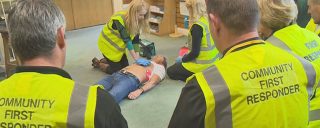CFR Ireland
Heart Attack
CFR Ireland
Heart Attack
Call 999/112 at the first sign of a Heart Attack.
The heart is a muscular bag which squeezes to pump blood around our bodies. Like all muscles it has its own blood supply and the coronary arteries are responsible for bringing blood to the heart muscle. These arteries can become damaged from a condition called atherosclerosis which involves the build up of plaques on the inner surface of the arteries. If a break occurs in one of these plaques, a blood clot forms at this site in the artery and blocks off the blood supply to some of the heart muscle. If this occurs, the muscle gets damaged and the condition is called a heart attack.
Heart attack symptoms:
- Chest pain
- Upper body pain in the jaw, back, neck or arms
- Shortness of breath
- Sweating
- Nausea
- Light-headedness
- Loss of consciousness
- Weakness
- Tiredness
The most common symptom of a heart attack is chest pain. This is usually a crushing or tight pain, which may move to your jaw or your arms, particularly on the left side. You may also feel short of breath, sweaty or sick. Some people may feel light-headed or lose consciousness. You may become anxious or very afraid. However 10 to 15 per cent of people who have a heart attack may not feel anything. This is more common in older people, especially women and those with diabetes. Sometimes these people just feel weak, tired or short of breath. Some elderly patients may simply become confused.
How is a heart attack diagnosed?
Your doctor will make a diagnosis of heart attack based on a number of factors. It is sometimes a very difficult diagnosis to make and it may take a few days to make sure the diagnosis is correct. First of all, the type of chest pain and how long it lasts is very important information to help make the diagnosis. Secondly your doctor will look at an image of the electricity going through your heart called an electrocardiogram (ECG). There are certain patterns on the ECG, which suggest a heart attack. Lastly, your doctor will carry out blood tests, which will help confirm the diagnosis.

Tips on:
Contact
CFR Ireland
ABOUT CFR
Founded
Number of Groups
Number of Volunteers
AED Registered
CFR Ireland
JOIN OUR NEWSLETTER
